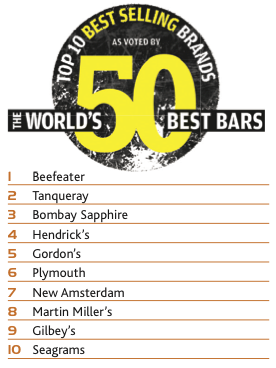Beefeater was given a new lease of life when it entered the hands of Pernod Ricard. The gin was part of Allied Domecq, which Pernod purchased in 2005. 
For the past seven or eight years, the company has repositioned a brand that people knew had the taste – arguably it just lacked the right positioning. Now, with its London-centric marketing strategy, the gin is spreading the London love all over the world.
And there have been brand extensions in several forms, including Beefeater 24 – the labour of love from master distiller Desmond Payne.
Tanqueray belongs to the Diageo camp and the recipe for the crisp, London Dry gin is a secret – though it’s widely thought to contain just four botanicals.
From one extreme to the other, let’s take a look at a lesser-known brand on the ‘trending’ list: Monkey 47. Yep, you’ve guessed it – the gin contains 47 ingredients. It hails from the Black Forest in Germany, where an English gent is said to have settled following a stint in Berlin after the Second World War.
While in Berlin, he rebuilt a zoo and sponsored a monkey called Max – stay with me, this is going somewhere. When the zoo was finished, he moved to the Black Forest and opened a guest house called The Wild Monkey.
 That’s where we leave the English gent. His recipe was discovered at the turn of the 21st century when the guest house was being renovated – and the gin was first reproduced in 2008 – under the name Monkey 47.
That’s where we leave the English gent. His recipe was discovered at the turn of the 21st century when the guest house was being renovated – and the gin was first reproduced in 2008 – under the name Monkey 47.
San Francisco’s Anchor Distilling makes Junipero gin, which boasts “more than a dozen” botanicals. As with many other distillers, the exact botanicals and quantities remain a secret.
One distiller which isn’t so secretive with its botanicals is Bacardi and its Bombay Sapphire. The famous blue bottle is adorned with the names of the botanicals and the gin was arguably one of the first to champion botanicals. As well as the usual suspects, it boasts cubeb berries, almonds and grains of paradise.
It’s interesting to see Martin Miller’s gin appear on this list. The gin claims to be “born of love, obsession and some degree of madness”.
It has a relatively modest 10 botanicals and it’s distilled in the UK – but it is cut down to strength with Icelandic water. That’s a 3,000 mile round trip for the gin. Bartenders and their customers obviously think it’s worth the journey.
How we did it
Since we relaunched the World’s 50 Best Bars, we think we’ve built up a pretty fantastic list of top bars and phenomenal bartenders from all over the world.
To create an even better global picture, we also polled 100 of the top 200 bars. When I say ‘we’, it was actually an independent research company called Leslie Henry Marketing & Research.



